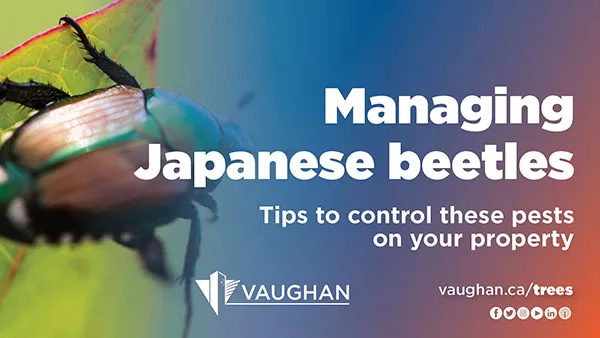Managing Japanese beetles
Tips to control these pests on your property
You may be seeing an increase in Japanese beetles throughout the community this summer. These are invasive insects commonly found on plants such as elm, maple, grape vine, peach, apple, apricot, cherry, plum, rose, zinnia, corn, asparagus, soybean, blueberry, raspberry and blackberry. The City of Vaughan provides simple steps to help control the population and minimize the impact on your greenery.
You may be seeing an increase in Japanese beetles throughout the community this summer. These are invasive insects commonly found on plants such as elm, maple, grape vine, peach, apple, apricot, cherry, plum, rose, zinnia, corn, asparagus, soybean, blueberry, raspberry and blackberry. The City of Vaughan provides simple steps to help control the population and minimize the impact on your greenery.
Here are some tips you can use on your property:
- Hand pick and dispose of the first beetles you see. These first beetles send out chemical pheromones that attract more beetles to the area.
- Plant non-attractive plants such as arborvitae, baby’s breath, begonias, bleeding hearts, buttercups, columbine, catnip, chives, garlic, tansies, daisies and flowering dogwood.
- Use a soap-water spray (one part liquid soap to 40 parts water). This mixture works best when the beetles are present in small numbers.
- Try pheromone traps. These can be used to attract the beetles to allow you to dispose of them offsite. These are available at most nurseries and big-box retail stores.
Combining and repeating methods often is the best approach to control these insects.
The Japanese beetle is native to the main islands of Japan and was first discovered in North America in southern New Jersey in 1916. There is only one generation per year. Adults appear in the summer and are very active for about six to eight weeks. Their typical life span is 30 to 45 days. The female deposits up to 60 eggs about eight centimetres deep in lawn soil and other grassy areas. The eggs take about two weeks to hatch and the larvae begin to feed on grassroots. The larvae go dormant as temperatures start to drop in the fall, then emerge as adult beetles the following year in late June or early July. Adults eat the tender tissue between the veins of the leaves of plants, leaving behind brown, skeletal remains.
For more information on these insects and how to manage them, watch the City’s quick educational video.
If you have concerns about plants on your property, contact a plant care professional. Additional resources can be found on the Government of Canada’s Japanese beetle webpage.
If you have concerns about plants on your property, contact a plant care professional. Additional resources can be found on the Government of Canada’s Japanese beetle webpage.
-30-

